Despite the challenges it’s facing, the government of Ghana is handling the coronavirus pandemic in the country effectively. That is the unanimous verdict of journalists who participated at a video conference, organised by The African Network of Germany, on the global health crisis on Thursday.
—
Washing hands, social distancing and wearing face masks are also the order of the day in Ghana, part of government’s catalogue of measures to combat the spread of the disease in the country.
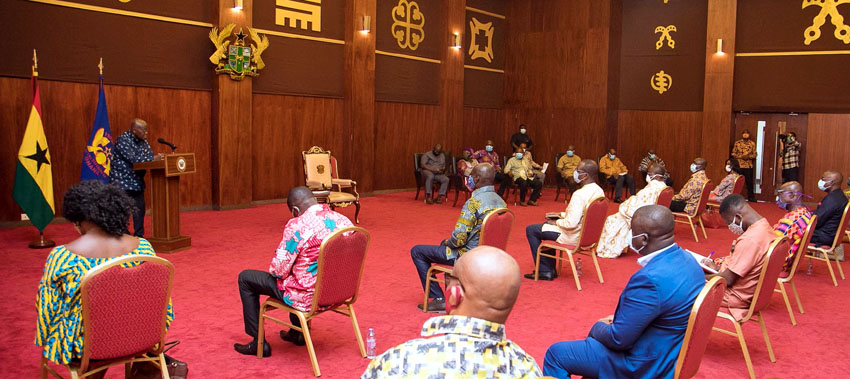
The West African nation of 20 million people is still comparatively better off in the war against the new coronavirus, Alhaji Kwame Tanko, a journalist at the Angel Broadcasting Network (ABN) in Kumasi, reported at the video conference, titled Coronavirus “The Situation in Africa”, on Thursday. The virtual meeting, organised by The African Network of Germany (TANG), was attended by 40 participants including four practising journalists who joined from Ghana.
Mr Tanko revealed that Ghana had tested more than 90,000 people for the virus, establishing 1,154 positive cases and registering 120 recoveries while it had recorded 9 deaths as of 23 April. He enumerated the various containment measures taken by government, including intensified testing and aggressive contact tracing, and asserted that “Ghana is doing its best to get ahead of the virus”.
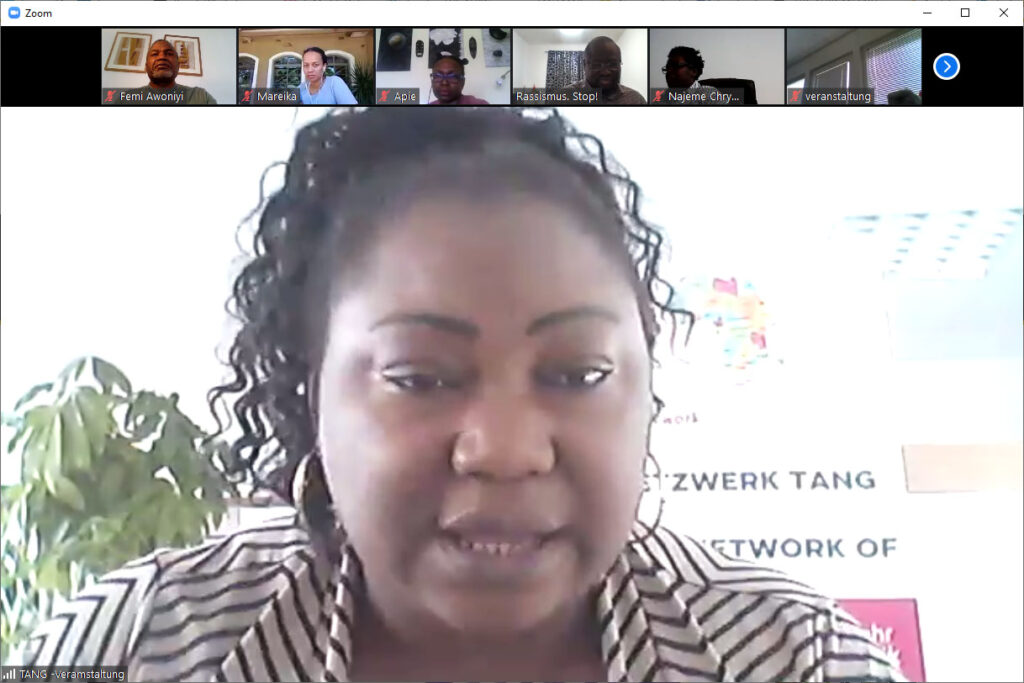
After the first infected person was discovered on 12 March, Ghana quickly closed its borders and ordered a total lockdown on the capital Accra and two other metropolis, Kumasi and Sunyani, which meant people had to stay in-doors.
The government lifted the 3-week lockdown on Monday, but schools remain closed and a ban on public gatherings is still enforced. Moreover, the country’s borders remain shut and the wearing of face masks made mandatory across the Greater Accra region as from 22 April.
The government is also monitoring markets and public transporters closely to ensure that social distancing regulations are observed. Violations have been met with stiff sanctions, Tanko said.
“Exercising intensive personal hygiene and keeping social distance are the best measures against infection with the coronavirus. But it’s not easy to convince people,” Kwadwo Dickson, a journalist at ABN FM in Accra, commented at the conference, which brought together regional executives of TANG, a network of hundreds of Africans associations in Germany, with the journalists from Ghana.
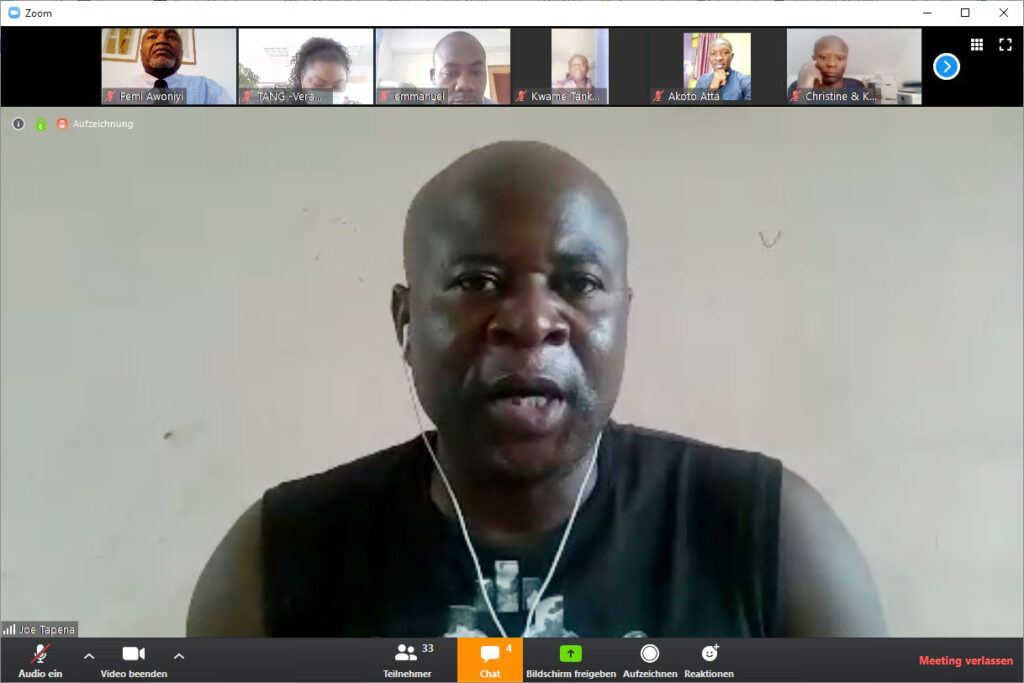
Mr Dickson talked about how his radio station educates people on the pandemic in their native languages to ensure that the message is well received. “It is important to raise the awareness of market women who come together with many people every day,” he said.
Other challenges of fighting the virus in Ghana include poverty, Dickson added. “It is difficult to convince people who are hungry to wear a mask,” he said. The virus also had to be fought in the overcrowded slums and prisons, where “people are locked up like sardines”, the journalist opined.
The stigmatisation of infected persons, which can lead to their isolation in their communities, is another major challenge that Dickson identified. People experiencing symptoms of the coronavirus infection might be unwilling to go for testing to avoid been stigmatised if they are found to be infected, he explained.
Dickson also gave the government a pass mark in its handling of the crisis. “The government is doing a good job. But we need more ideas from the diaspora,” he concluded.
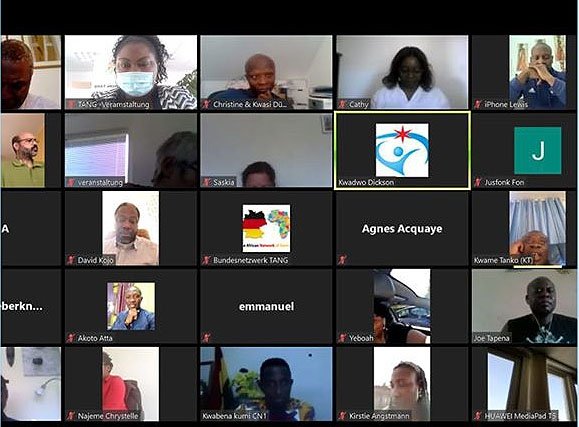
Involving all sections of society including the less-privileged ones, such as street children, is key to the success of the fight against the coronavirus, Kwabeno Kumi, a journalist at CN1 Radio in Accra, said in his own contribution to the debate.
“They need protection and would have to be removed from the street. But they also need a place to go,” he added. An education campaign for these children is now being planned, he revealed.
Kumi, a human rights activist, praised the public awareness efforts of government and called for the increased engagement of local communities, schoolchildren, students, teachers and civil servants.
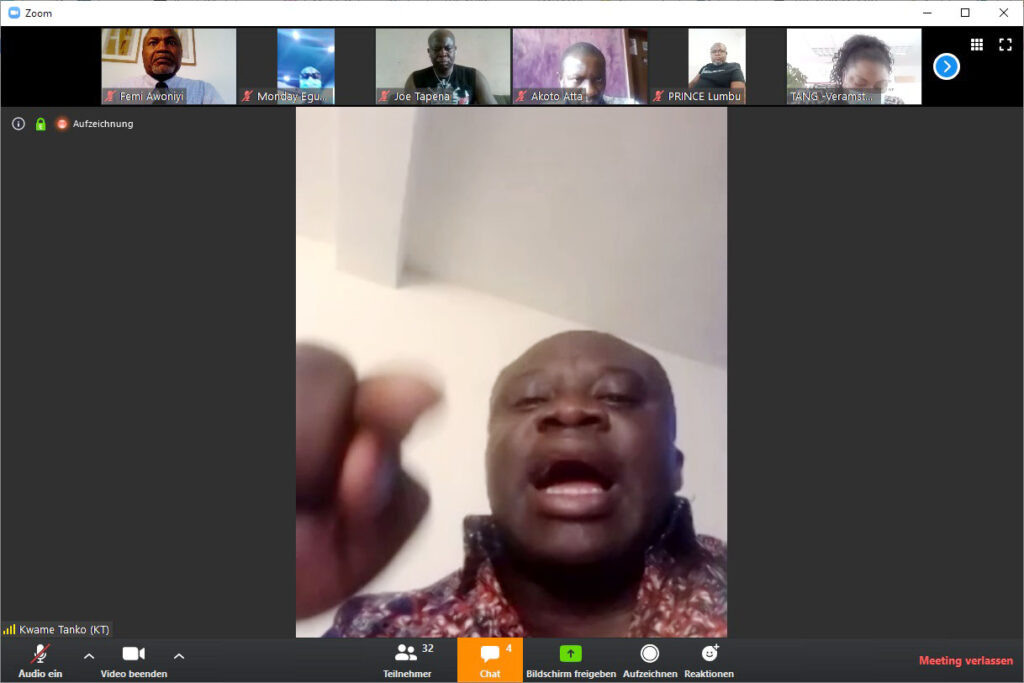
Joseph Tapena, who joined from Sunyani, the capital of the Bono Region, reported that there were still challenges in supplying health workers with enough personal protection gears and that many hospitals in the region lacked requisite equipment. He pleaded for international support.
Rounding up the discussions, Dr Sylvie Nantcha, chairman of TANG, said the video conference was held to find out the roles the diaspora could play in contributing to the fight against the coronavirus in Ghana. She promised that TANG, in collaboration with its member associations, would explore what the African diaspora in Germany could do to support street children and provide face masks in the country.
Journalists and humanitarian workers from Cameroon and Nigeria have also participated in the video conference series. Issues highlighted by participants from Africa include social hardship imposed on poor people by lockdown measures, lack of adequate supplies and equipment in hospitals and how fake news and superstitious beliefs hamper awareness campaigns.
Femi Awoniyi
READ ALSO Don’t lower your guard, TANG appeals to Africans in Germany over coronavirus
 THE AFRICAN COURIER. Reporting Africa and its Diaspora! The African Courier is an international magazine published in Germany to report on Africa and the Diaspora African experience. The first issue of the bimonthly magazine appeared on the newsstands on 15 February 1998. The African Courier is a communication forum for European-African political, economic and cultural exchanges, and a voice for Africa in Europe.
THE AFRICAN COURIER. Reporting Africa and its Diaspora! The African Courier is an international magazine published in Germany to report on Africa and the Diaspora African experience. The first issue of the bimonthly magazine appeared on the newsstands on 15 February 1998. The African Courier is a communication forum for European-African political, economic and cultural exchanges, and a voice for Africa in Europe.




























